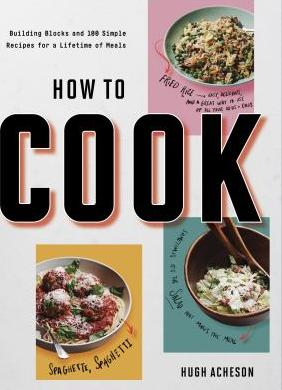
How to cook : building blocks and 100 simple recipes for a lifetime of meals
An empowering collection of impressive recipes that will teach young adults and kitchen novices all the skills they need to cook for themselves--from a James Beard Award-winning chef and author.
Available Copies by Location
| Location | |
|---|---|
| Victoria | Available |
Browse Related Items
| Subject |
| Cooking. |
| Genre |
| Cookbooks. |
- ISBN: 9781984822307
- Physical Description 223 pages : color illustrations ; 26 cm
- Edition First edition.
- Publisher [Place of publication not identified] : [publisher not identified], 2020.
Content descriptions
| General Note: | Includes index. |
Additional Information

How to Cook : Building Blocks and 100 Simple Recipes for a Lifetime of Meals: a Cookbook
Click an element below to view details:
Excerpt
How to Cook : Building Blocks and 100 Simple Recipes for a Lifetime of Meals: a Cookbook
What this book is all about My daughters, Beatrice and Clementine, are well into their teens. I don't think of myself as an overbearing parent, but I wrote that list for them sooner than I want to admit. Growing up the kids of a professional chef, they have been surrounded by good food their whole lives; when I think about them leaving home and living on their own, I want them to feel that they should still be surrounded by good food. I don't expect them to cook like I do, but I do want to make sure they have the basics to be able to feed themselves, their friends, and eventually their own loved ones good, delicious, simple meals. And so I wrote this book, so that you can, too, whether you're leaving home as a teenager, or making your own home, or starting your own family. What follows is a really simple concept. There are a few ways to cook. One is to read recipes and stress about following them to the letter. Another is to dive into a kitchen and absorb everything, until you can make a bisque, brioche, or baked ziti without ever opening a cookbook. What I think is the most approachable way to go about it is somewhere in the middle. There should be some very basic things that you know how to make almost from memory. I'm talking about a classic vinaigrette that you can use to dress salads, but also tweak to use as a sauce for roasted vegetables or meats or fish. Or how to cook pasta. Or a perfect grilled cheese, or how to roast a chicken or stir together a simple, flavor-packed herb sauce you can put on anything. Don't worry, there are no tests; you don't really have to memorize any recipes. But I want you to get comfortable making these very basic things, so that you can tweak them, add to or subtract from them, or mix and match them with stuff you have in your fridge, so you can make a meal anytime. Envision a Lego set of cooking skills; once you have those building blocks at hand, cooking becomes a skill you have forever. So the first part of this book is dedicated to twenty-five building blocks that will anchor your world of cooking and give you the ability to build a system of nourishment. As a professional cook, I rely on core ideas of food to create dishes and menus, and there is no reason you shouldn't do the same. I've chosen the recipes for the building blocks not just because they're great to make and eat and are flexible in how you use them, but also because in learning to make them, you will learn techniques you can apply to other foods. Learning how to sear a steak, for instance, will give you the same tools you need for searing pork chops or chicken breasts; roasting broccoli will teach you how to roast cauliflower or asparagus. After those initial building blocks, there are seventy-five more recipes for you to use your new skills . . . or to use the leftovers of what you've already made. In fact, you might want to make some of the building blocks on a Saturday or Sunday afternoon and keep them in your fridgeto cook with through the week. I want you to think of leftovers not as "leftovers," but as great ingredients that you can turn into new meals. And with that, you'll be able to cook anytime, forever. Excerpted from How to Cook: Building Blocks and 100 Simple Recipes for a Lifetime of Meals: a Cookbook by Hugh Acheson All rights reserved by the original copyright owners. Excerpts are provided for display purposes only and may not be reproduced, reprinted or distributed without the written permission of the publisher.


